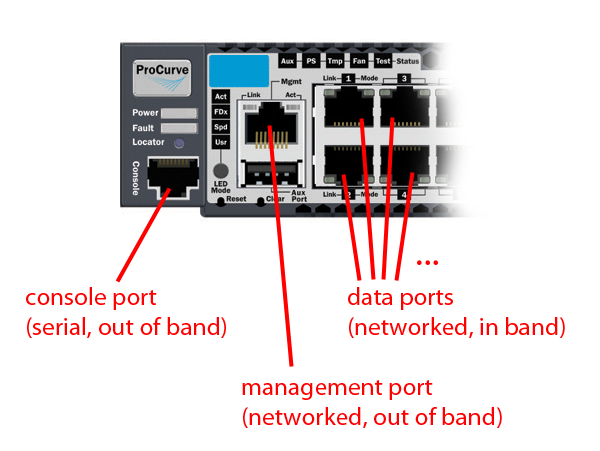Concepts
Management communications with a managed switch can be:
In band—through the networked data ports of the switch
Out of band—through a dedicated management port (or ports) separate from the data ports
Out-of-band ports have typically been serial console ports using DB-9 or specially wired 8-pin modular (RJ-style) connectors. Some recent HPE switches have added networked OOBM ports. The following figure shows management connections for a typical switch.

OOBM operates on a "management plane" that is separate from the "data plane" used by data traffic on the switch and by in-band management traffic. That separation means that OOBM can continue to function even during periods of traffic congestion, equipment malfunction, or attacks on the network. In addition, it can provide improved switch security: a properly configured switch can limit management access to the management port only, preventing malicious attempts to gain access via the data ports.
Network OOBM typically occurs on a management network that connects multiple switches. It has the added advantage that it can be done from a central location and does not require an individual physical cable from the management station to each switch's console port.
The following table summarizes the switch management ports.
In band |
Out of band |
||
|---|---|---|---|
Networked |
Directly connected |
Networked |
|
Management interface |
Command line (CLI), menu, Web |
Command line (CLI), menu |
Command line (CLI), menu |
Communication plane |
Data plane |
Management plane |
Management plane |
Connection port |
Any data port |
Dedicated serial or USB console port |
Dedicated networked management port |
Connector type |
Usually RJ-45; also CX4, SFP, SFP+, and XFP |
DB9 serial, serial-wired 8-pin RJ |
RJ-45 |
Advantages |
Allows centralized management |
Not affected by events on data network, shows boot sequence |
Not affected by events on data network, allows centralized management, allows improved security |
Disadvantages |
Can be affected by events on data network; does not show boot sequence |
Requires direct connection to console port (can be done via networked terminal server) |
Does not show boot sequence |